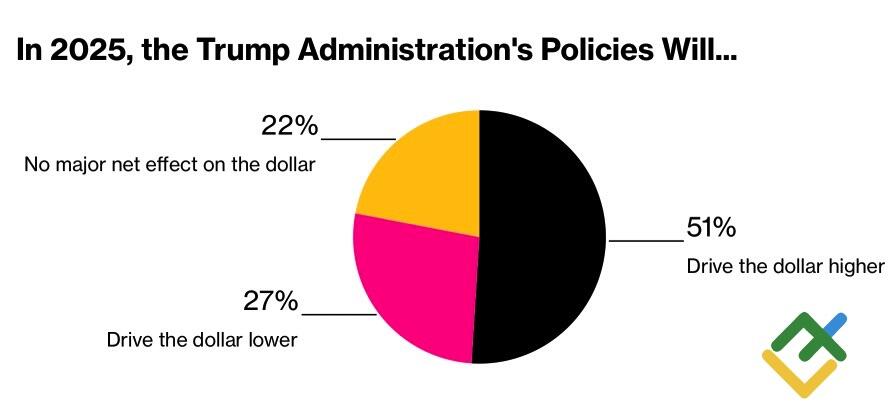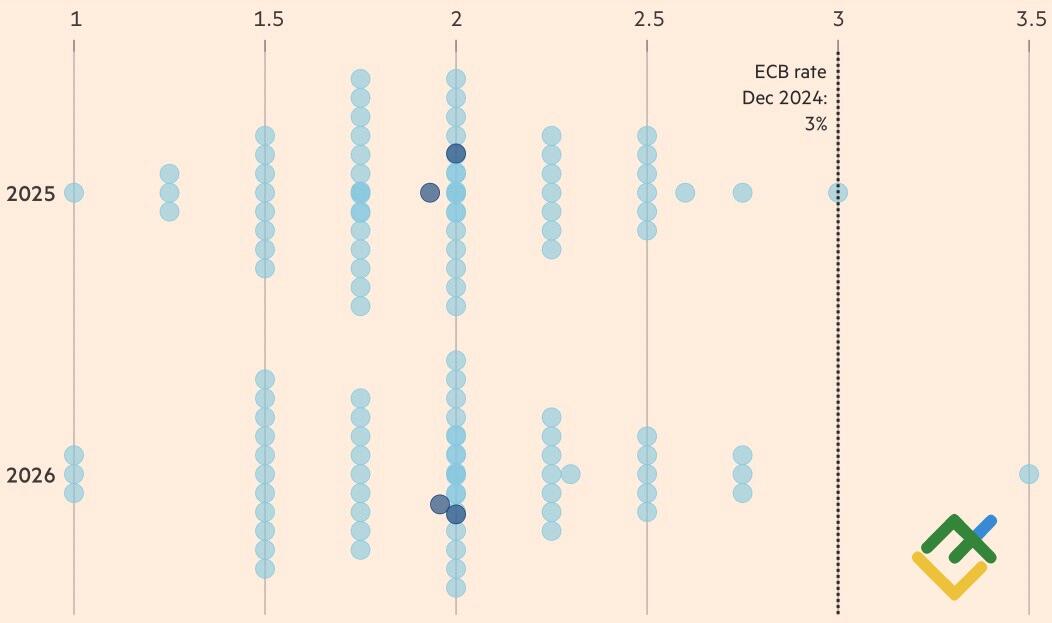
The direction of the EURUSD exchange rate has been determined. The only outstanding question is when the major currency pair will reach the parity level and whether it will continue to decline. Let’s discuss these topics and make a trading plan.
The article covers the following subjects:
Major Takeaways
- Soaring demand for safe-haven assets has pushed the euro below 1.03.
- The ECB acted too slowly in 2024.
- The US labor market report will determine the Fed’s pause duration.
- Short trades can be opened on the EURUSD pair on a rebound from 1.0335 or 1.0365.
Weekly US Dollar Fundamental Forecast
The US dollar’s strength hurts the euro. The EURUSD exchange rate reached its lowest level in two years, hitting the first of two previously announced bearish targets of 1.03 and 1. This decline occurred amid capital flight to safe-haven assets due to attacks in New Orleans and Las Vegas. The Santa Claus rally in the US equity market remained elusive, and the surge in demand for less risky assets forced EURUSD bulls to retreat.
According to Societe Generale, if capital continues to flow to the United States and the US economy remains resilient, the US dollar is in a strong position. 51% of MLIV Pulse respondents expect the US dollar to strengthen in 2025, with only 27% anticipating it to weaken. Rabobank, Wells Fargo, and Investec forecast parity in the EURUSD exchange rate in the second quarter, and Danske Bank predicts this will happen in the medium term.
Forecasts on US Dollar
Source: Bloomberg.
The prevailing bearish sentiment is rooted in the expectation that Donald Trump’s fiscal stimulus and deregulation will boost the US economy and spur inflation. At the same time, new tariffs are anticipated to impede Eurozone GDP growth and unleash a flood of low-cost Chinese goods into the European market, potentially leading to deflation in the region.
As a result, the derivatives market anticipates a 43bp decline in the federal funds rate in 2025 and a 108bp decrease in the ECB’s deposit rate. The divergence in the pace of monetary expansion strongly supports the view that the EURUSD pair will reach parity and fall below this threshold.
According to 46 Financial Times experts, the European Central Bank is lagging in its response to this scenario, as it has been gradually reducing borrowing costs in 2024. The survey also revealed that 43% of respondents believe monetary policy was on the right track, and the consensus forecast indicates a 100bp decrease in the deposit rate to 2%. However, only 19% of respondents anticipate a continuation of the monetary expansion cycle in 2026, with the majority believing the level will be reached in 2025.
ECB Deposit Rate Forecast
Source: Financial Times.
The current market narrative is unambiguous; the focus now shifts to timings. According to Richmond Fed President Thomas Barkin, Donald Trump’s policies are likely to accelerate inflation, but if they result in an economic slowdown, the White House may roll back certain measures, leading to a tug-of-war scenario in the EURUSD exchange rate.
The report on the US labor market for December will provide a litmus test of the downtrend’s stability in the main currency pair. Reuters experts estimate employment growth of 150,000 and unemployment to remain at 4.2%. While markets anticipate a Fed pause in January, stronger statistics could point to another pause in March, supporting the greenback.
Weekly EURUSD Trading Plan
In light of the upcoming release of significant data and the ongoing uncertainty surrounding Donald Trump’s policies, the EURUSD pair is likely to undergo a period of consolidation. In this case, one may consider opening short positions on a rebound from the resistance levels of 1.0335 and 1.0365 or once the pair’s quotes fall below 1.0255.
Price chart of EURUSD in real time mode
The content of this article reflects the author’s opinion and does not necessarily reflect the official position of LiteFinance. The material published on this page is provided for informational purposes only and should not be considered as the provision of investment advice for the purposes of Directive 2004/39/EC.
{{value}} ( {{count}} {{title}} )
This post is originally published on LITEFINANCE.





